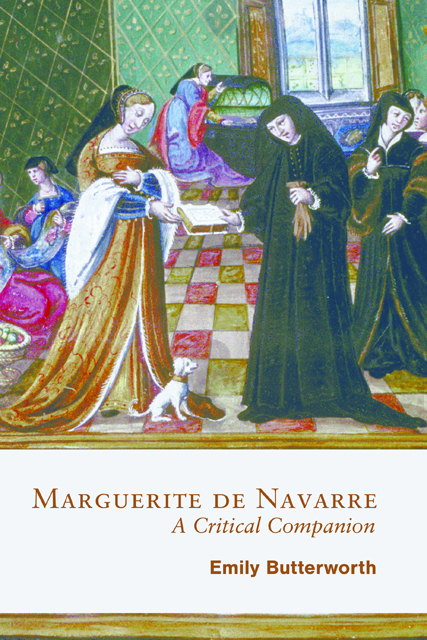Book contents
- Frontmatter
- Dedication
- Contents
- List of Illustrations
- Acknowledgements
- Note on Names and Editions
- Editions of Reference
- Introduction: A Brief Literary and Historical Chronology
- 1 Communities
- 2 Religion
- 3 Politics
- 4 Women and Men
- 5 Desire
- 6 Form and Technique
- Conclusion: Print and Public
- Bibliography
- Index
1 - Communities
Published online by Cambridge University Press: 20 December 2023
- Frontmatter
- Dedication
- Contents
- List of Illustrations
- Acknowledgements
- Note on Names and Editions
- Editions of Reference
- Introduction: A Brief Literary and Historical Chronology
- 1 Communities
- 2 Religion
- 3 Politics
- 4 Women and Men
- 5 Desire
- 6 Form and Technique
- Conclusion: Print and Public
- Bibliography
- Index
Summary
Marguerite de Navarre led a sociable and mobile life. Sister and trusted advisor to François I, a peer of France as duchess of Berry, and queen of Navarre through her second marriage to Henri d’Albret, she was at the heart of multiple circles and networks. She was exceptionally well connected, even for an aristocrat of her time, and a rare woman in networks of professional, erudite, and elite men. She supported writers and theologians, especially the reformists known as Evangelicals; corresponded with many radical thinkers, including Martin Luther, Jean Calvin, and Vittoria Colonna; and negotiated with foreign diplomats on behalf of both France and Navarre. Frequently on the move with her brother’s court or travelling through her own extensive territories, she was a powerful political patron and broker and built up what historian Jonathan Reid refers to as a ‘Navarrian network’ over the course of her life.
She seems to have been temperamentally inclined to the sociability her status made possible for her. Well educated, witty, and intelligent, she appears in contemporary accounts as the consummate Renaissance princess. In Pierre de Brantôme’s late sixteenth-century histories of illustrious French ladies, Marguerite is seductive company:
Durand la prison du Roy son frere, elle assista fort à Madame la Regente, sa mere, à regir le Royaume, à contanter les Princes, les Grands, et gaigner la Noblesse; car elle estoit fort accostable, et qui gaignoit bien le coeur des personnes pour les belles partyes qu’elle avoit en elle.
During the imprisonment of the King her brother, she greatly assisted Madame the Regent, her mother, in governing the kingdom, in pacifying princes and the powerful and in winning over the Nobility; for she was extremely amiable, and easily won people’s hearts for the handsome qualities she had.
In Brantôme’s account, Marguerite appears a witty, warm, and sociable presence; but he also suggests the difficulties and challenges a noblewoman – even an extraordinarily powerful noblewoman like Marguerite – faced in the early sixteenth century. Her role was to pacify and to win round; to build bridges, to cajole, and to persuade. Sixteenth-century rule was a delicate balancing act between imposing authority and mollifying powerful noble families.
The forms of sociability available to Marguerite were unquestionably elite, and her power and autonomy were exceptional even in these circles.
- Type
- Chapter
- Information
- Marguerite de NavarreA Critical Companion, pp. 10 - 40Publisher: Boydell & BrewerPrint publication year: 2022



